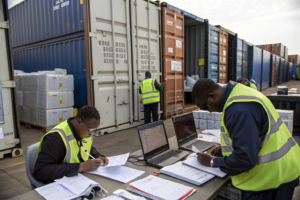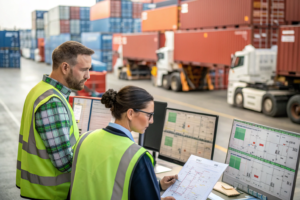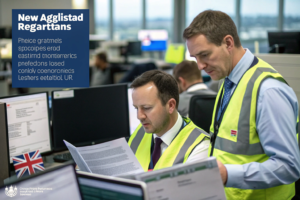Every international shipment your company sends is part of a complex regulatory ecosystem. One small compliance mistake—be it the wrong HS code, missing certificate, or late filing—can trigger audits, fines, or delayed cargo. For Ron and other U.S.-based importers sourcing from China, compliance audits are a growing concern.
Yes, experienced freight forwarders are essential in supporting and preparing your business for compliance audits. From accurate documentation to regulatory monitoring and risk management, they serve as your first line of defense against audit failures and customs issues.
At GeeseCargo, we've helped hundreds of clients pass compliance reviews by U.S. Customs and international trade authorities. In this article, I’ll show you how freight forwarders reduce your risk, organize your paperwork, and ensure your shipments always meet regulatory expectations.
What Documents Do Freight Forwarders Help Manage?
Documentation is the foundation of trade compliance. Every shipment needs consistent, accurate paperwork from the point of origin to final delivery.
Freight forwarders compile and verify all documentation required for customs clearance, regulatory reporting, and audit readiness. This includes commercial invoices, packing lists, HS codes, certificates of origin, fumigation certificates, and more. These documents must align precisely with the physical cargo and digital entries submitted to customs.

What Happens if Shipping Documents Are Inconsistent?
Inconsistencies across documents can raise red flags during customs reviews. For example, if your invoice lists “cotton socks,” but the HS code belongs to synthetic textiles, your shipment could be flagged. Learn how these inconsistencies impact clearance from CBP's Import Guidelines.
At GeeseCargo, we use document verification tools and human checks to ensure alignment. We also use templates approved by customs to reduce format-related delays. You can see how standardized formats help improve processing accuracy.
Can Freight Forwarders Store Documentation for Audit Purposes?
Yes. We maintain digital copies of all documents for a minimum of five years, as required by U.S. CBP and many European authorities. Documents are stored in encrypted databases and can be accessed during audits. Some of our clients have successfully defended tariff classification audits using documentation we retained. Read more about recordkeeping rules for importers and brokers.
How Do Forwarders Monitor Regulatory Changes?
The freight landscape is in constant flux. Regulations can change based on bilateral trade agreements, sanctions, product recalls, or environmental policies.
Freight forwarders stay up-to-date with customs changes and notify clients in advance so they can stay compliant. At GeeseCargo, we subscribe to global databases and customs bulletins, allowing us to adapt quickly when requirements shift. We provide alerts about tariff updates, anti-dumping investigations, and labeling laws that may affect your shipments.

How Often Do Trade Regulations Change?
More often than you think. For example, new Uyghur Forced Labor Prevention Act requirements added extra scrutiny to shipments involving certain raw materials. And REACH chemical regulations frequently impact clothing and accessory imports into the EU. Forwarders help identify your product's risk exposure.
How Do Forwarders Translate Regulatory Alerts into Action?
When laws change, we review your product line for affected SKUs. We then recommend new compliance measures such as origin declarations, additional testing, or reclassification. This proactive approach helps avoid costly audit findings or denied entries. Explore the World Customs Organization updates to understand how forwarders integrate this info into their SOPs.
What Role Do Forwarders Play in Customs Communication?
When customs initiates an audit or requests clarification, response time and accuracy are everything.
Freight forwarders serve as the primary liaison between your business and customs authorities during audits. We answer questions, provide supplemental paperwork, and help clarify declarations. Our familiarity with customs procedures allows us to de-escalate issues quickly, often resolving matters before they escalate into penalties.

What Kinds of Customs Inquiries Do Forwarders Handle?
Customs may request additional invoices, packing list clarification, product certifications, or proof of valuation. At times, they question HS code accuracy or ask for product composition breakdowns. Learn about common Customs Inquiries that forwarders can address on your behalf.
We use direct communication channels with U.S. CBP, EU TARIC, and other major customs bodies. This ensures fast turnaround and reduced detention risks. Check how authorized economic operators (AEO) programs enhance this interface.
How Does a Forwarder Prepare You for a Customs Audit?
Before an audit even starts, we conduct an internal review of your shipping history, documentation trail, and classification practices. This “mock audit” helps us identify gaps and correct them early. We also recommend which documents to present and how to explain sourcing practices or valuation methodologies to auditors. See the U.S. Customs Audit Handbook for more on audit readiness strategies.
How Do Freight Forwarders Reduce Risk Exposure?
Prevention is better than correction—especially in logistics.
Forwarders help assess and reduce compliance risk through classification checks, origin tracing, and product-level risk scoring. We identify shipments that may be subject to trade barriers, forced labor scrutiny, or dual-use restrictions. Our risk models consider country of origin, product category, and historical audit data.

Which Products Are High Risk in Compliance Reviews?
Products made from leather, cotton, batteries, or electronics often face stricter reviews. For instance, if you're shipping leather belts, your documentation must prove non-endangered animal sourcing. Check the U.S. Fish and Wildlife CITES guidance for regulated materials. We assess this before loading your goods.
How Does Risk Scoring Prevent Delays?
We assign each shipment a compliance score based on documentation quality and regulatory exposure. If your shipment scores low, we initiate extra checks before export. This reduces risk of holds, fines, and rejected entries. Review how compliance scoring tools are becoming standard in supply chain security.
Conclusion
Compliance audits are inevitable in international trade—but penalties and delays don’t have to be. With a forwarder like GeeseCargo at your side, you gain not just a freight handler, but a compliance partner. We keep your documents aligned, your processes up to date, and your shipments moving.
So if you've ever worried about a random audit or delayed entry, know that with us, your business is always one step ahead of the regulators.









